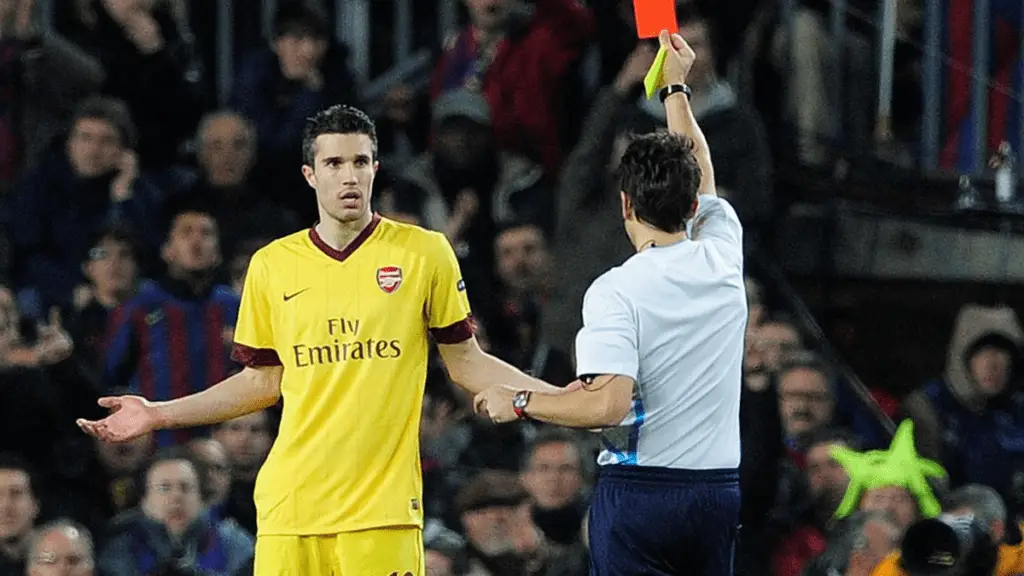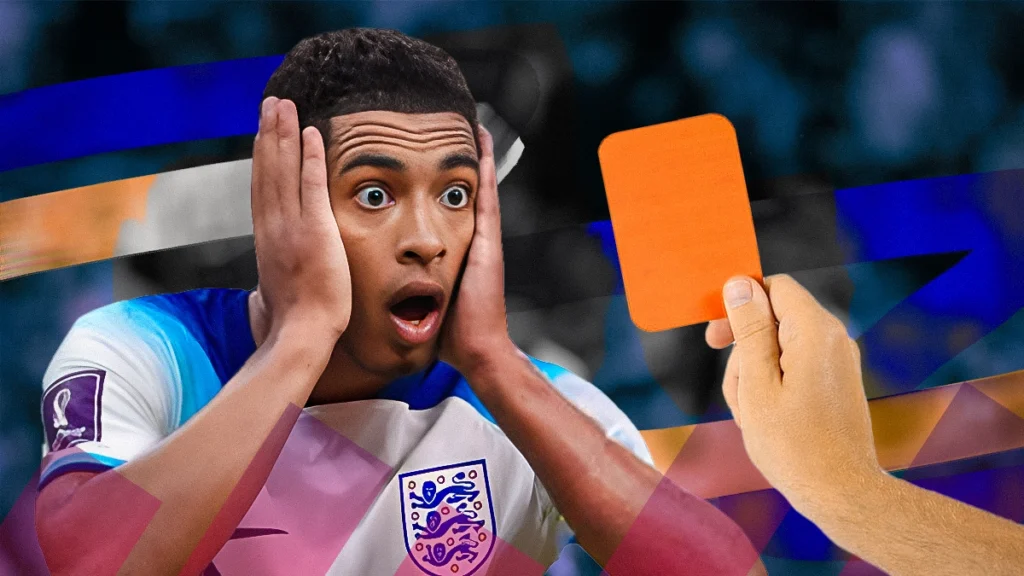What an Orange Card means in football: If you’ve watched enough football matches with English commentary, then you’ve surely heard the term “ORANGE CARD.” This concept has been suggested by pundits, referees, and football stakeholders as a fitting punishment for an offense not too serious to deserve a red card but a little too grave for just a yellow.
Shop Jerseys: Goal90.shop
This is not a recent concept. Talks about introducing an orange card have been around for about a decade now. In 2014, former FIFA presidential candidate Jerome Champagne publicly suggested the introduction of an extra caution card into football games.
Veteran English ref, George Courtney, also supported the introduction of the orange card, saying it would be a very welcome idea.
If FIFA were actually to go through with the orange card idea, and what an Orange Card means in football

Refs will still have the yellow and red cards and will use them as they are normally used now. However, for some fouls that are not exactly deserving of a sending off but are a little too serious for just a yellow, refs would produce the orange card.
The major difference between all three cards would be seen in the punishment. Of course, you know the yellow is a warning, and players who see red are immediately sent off and suspended from future games. But then players who receive the orange card would only be required to leave the pitch for a brief period of time, after which they would rejoin the game.
For the period they would be off the pitch, they would be sent to a sin-bin.

If you watch ice hockey, then you are surely familiar with what a sin-bin is. It is basically a place—it could be a bench or a box—where offending players are sent as a form of punishment. It is also called a penalty box, but of course, that has a whole different meaning in our game.
Now, the team to which the recipient of the orange card belongs is made to play with a man down for a period of time. Maybe 10 minutes, as former Crystal Palace chairman Simon Jordan suggested. Jordan, by the way, seemed to have a lot of this orange card thing figured out.
He suggested that, for example, if a player’s first yellow was for taking his shirt off and the second was for, say dissent, he should be given the orange card and sent to the sin-bin since the offenses aren’t so serious.
Of course, during this period when the player is in the sin-bin, the team would not be allowed to substitute him out of the game.
What is unclear, though, is what multiple cards will result in. Will two orange cards lead to a much harsher red? Maybe a 5-match ban? What of a yellow and an orange? Of course, all that will have to be worked out first if it is to be introduced into the game of football.
But that introduction won’t be so easy, though, as not everybody is on board with the idea. Former English referee and FA assessor, Roger Milford, said that the orange card would make the game of football a little too dictatorial.
Honestly, we don’t yet know how we feel about the orange card, so help us out here. What do you think? Good idea or bad idea? Honestly, we think it could be both.
Why do we think it could be a bad idea?
The complications and the controversy. As it stands, we already hear too many complaints about refs being too quick to go to their pockets, issuing cards when the fouls could very easily have been overlooked. With an extra card in their pockets, we could see a lot more unnecessary bookings.
Furthermore, a lot of the issuing of the orange card will be left to the discretion of the ref, and that could lead to a truckload of controversy. It may be best to just avoid all of that.
Also, players may try to find loopholes and commit some offenses they originally wouldn’t have, knowing that they will only be sent to the sin-bin for a few minutes, get back to the game, and even possibly avoid suspension from subsequent games.
But then, it could also be a good idea as it could reduce the number of unnecessary red cards we see in football. Surely, there are some fouls you’ve seen that didn’t deserve a sending off, but definitely deserved more than a yellow. An orange card would come in handy in situations like these.

For example, an orange card instead of a red one could have been shown to Zlatan Ibrahimovic for his foul on Oscar in the 31st minute of the Champions League game between PSG and Chelsea in 2015. Considering Zlatan withdrew from the challenge and obviously didn’t intend to hurt the opponent, he could have been given a much lighter punishment than a sending off – an orange card.

Another very perfect example is the infamous red card that was issued to Van Persie in that Champions League tie against Barcelona. We all agree that sending off was too harsh for RvP’s offense, don’t we?
So, if we were to go Simon Jordan’s route, the former Arsenal striker could have been sent to the sin-bin for maybe 10 minutes for his soft second yellow and allowed to come back to help his team out in the game.
There are many more instances like this we could provide where the orange card could be a great idea. And of course, there are also many instances where it may seem like a horrible idea. Basically, the introduction of the orange card, just like VAR, could be both a blessing and a curse.
But we really want to hear from you. What do you think? Should FIFA introduce the orange card into football?
Give us reasons for your answers in the comments.









